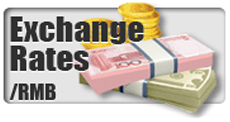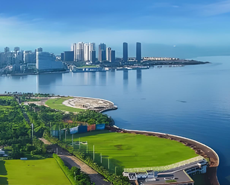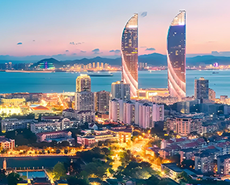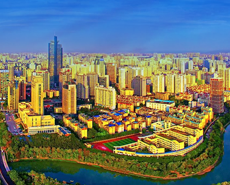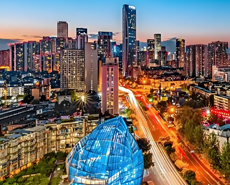
Zinc die-casting alloy market to witness fiercer competitions
----Interview with Lijun Mao
Vice General Manager
Ningbo Xindu Metal Materials Co., Ltd.
Vice General Manager
Ningbo Xindu Metal Materials Co., Ltd.
Ningbo Xindu Metal Materials Co., Ltd. is an alloy production company specializing in high-quality zinc alloy materials. Thanks to years of hard work, it now owns two subsidiaries (Ningbo Hongda Metal Materials Co., Ltd. and Ningbo Liming Metal Materials Co., Ltd.). Located in Yinjiang Meiyuan Industrial Park of Ningbo city and covering a land area of 10,000 square meters, the company has a monthly production capacity of 6,000t now. With excellent technical strengths, it has been granted with GRS and ISO certificates. Its technical accumulation over a dozen years has helped its products win established acceptance by clients.
Asian Metal: Hello, Mr. Mao. Thanks for taking our interview. Would you please give a brief introduction to your company at first?
Mr. Mao: Founded in 2007, our company is an alloy production enterprise specializing in high-quality zinc alloy products. Situated in Yinjiang Meiyuan Industrial Park of Ningbo City, it has a land area of 10,000 square meters and a monthly production capacity of 6,000t. It has been granted with GRS and ISO certificates, with products produced in environmentally-friendly line-frequency furnaces and production lines installed with full-automation ingot casting and ingot placing systems. We use Hitachi spectrograph to control our alloy quality and adopt the U.S. ASTM B240 standards. Having passed the SGS certification, we are qualified to export our products to Europe and the U.S. where environmental protection standards RoHS are enforced and to Europe where REACH Act is enforced.

Asian Metal: What are your major products? And how is your operation going on now?
Mr. Mao: Our zinc alloy portfolio mainly consist of Zamak-2, Zamak-3, Zamak-4, Zamak-5 and Zamak-8 varieties, which are high-end alloys used for die-casting industry, and we also provide customizing service for clients who have particular requirements on alloy tenacity. Now our products are widely used in bathroom ware, lockset, hardware accessory, auto accessory, decoration article, and zipper industries. Thanks to a dozen years of operation and high quality of our products, we have a client base of over 200 companies now and are direct or indirect suppliers for many renowned companies. We have an annual production capacity of 72,000t of zinc alloy and maintain steady production now with monthly output hovering at around 3,500t. Our output in 2020 totalled about 40,000t and that in 2021 is expected to be 55,000t.


Asian Metal: In 2020 the COVID-19 pandemic raged all around the world. In the light of market conditions last year, how do you think of impacts of the pandemic on the zinc alloy market? Which downstream industries have been notably affected in terms of demand?
Mr. Mao: The COVID-19 imposed great effects upon the zinc alloy market. In 2020, our sales decreased generally by about 25% from those in 2019. Exports of zinc die-casting alloy’s end products generally account for 30-40% of their total consumption in China, and many of our clients come from industries such as zipper whose exports account for a large proportion of the total consumption. In 2020, with overseas pandemic situation continuously deteriorating, China’s exports such as zipper shrank notably, leasding to a great decrease in our sales. Moreover, statistics show that in 2020 global auto production decreased by over 20%, and accordingly demand for zinc die-casting alloy from auto accessory industry decreased significantly.
Asian Metal: How do you think of market demand for zinc die-casting alloy this year?
Mr. Mao: I believe that downstream demand will grow in 2021. With COVID-19 vaccines developed and populations vaccinated, the pandemic will be gradually go under effective control, and demand from various industries, especially from overseas markets, will release further, thus driving the increase in demand for zinc alloy. Taking our company as an example, in the first quarter of 2021 our production and sales totalled 8,000t, in contrast with only 5,400t in the same period of last year. Thus, we can say that demand has grown notably hits year.


Asian Metal: In your opinion, what are the common challenges faced by zinc die-casting alloy producers at present?
Mr. Mao: In my opinion, the biggest challenge is that there are more zinc ingot smelting plants beginning to produce zinc die-casting alloy by themselves. As far as I know, now in China there are about ten traditional zinc ingot smelting plants which produce zinc die-casting alloy, and I believe that in the future this number will further grow. Thanks to their advantages in capital, company background and raw material supply, such zinc ingot smelting plants can produce zinc die-casting alloy directly following zinc smelting and therefore save second-time smelting costs and transportation costs for raw materials bought from the market, and also spare themselves from traders’ price gaps. Compared with traditional zinc alloy plants, zinc ingot plants can save zinc alloy production costs by RMB200-400/t (USD30.82-61.65/t). For example, TCs for zinc die-casting alloy Zamak-3 produced by traditional alloy plants usually stay at RMB500-700/t (USD77.06-108/t), while those for the material produced by zinc ingot plants can be as low as RMB200-300/t (USD30.82-46.24/t). This leads to increasing market competition and shrinking profit margins of traditional zinc alloy plants.
Asian Metal: How should zinc alloy plants respond to this challenge?
Mr. Mao: In my opinion, on one hand alloy plants should switch from their extensive management model in old days to fine management, enhancing technical strengths and providing high-quality products and service to clients, and also try to make defective rates lower and increase direct purchase rate of raw material so as to fulfill the goal of costs reduction and efficiency improvements. On the other hand, alloy plants should enhance their innovation capacities of developing customized products to follow the market trend, and by targeting different niche markets, alloy plants can avoid direct competition with zinc ingot smelting plants.


